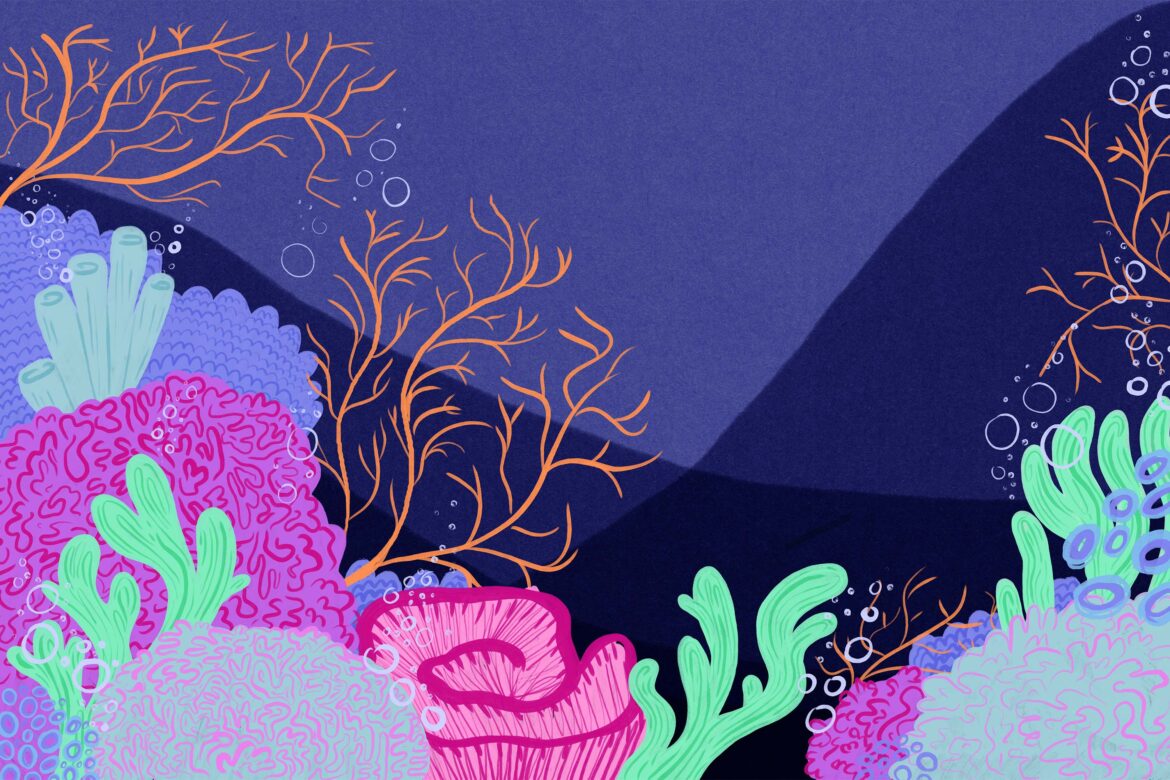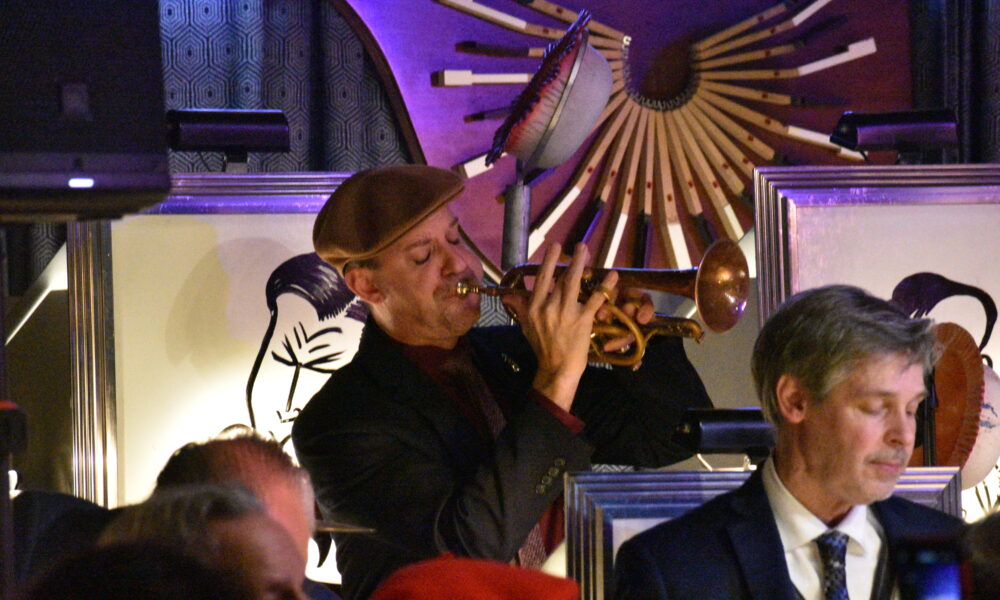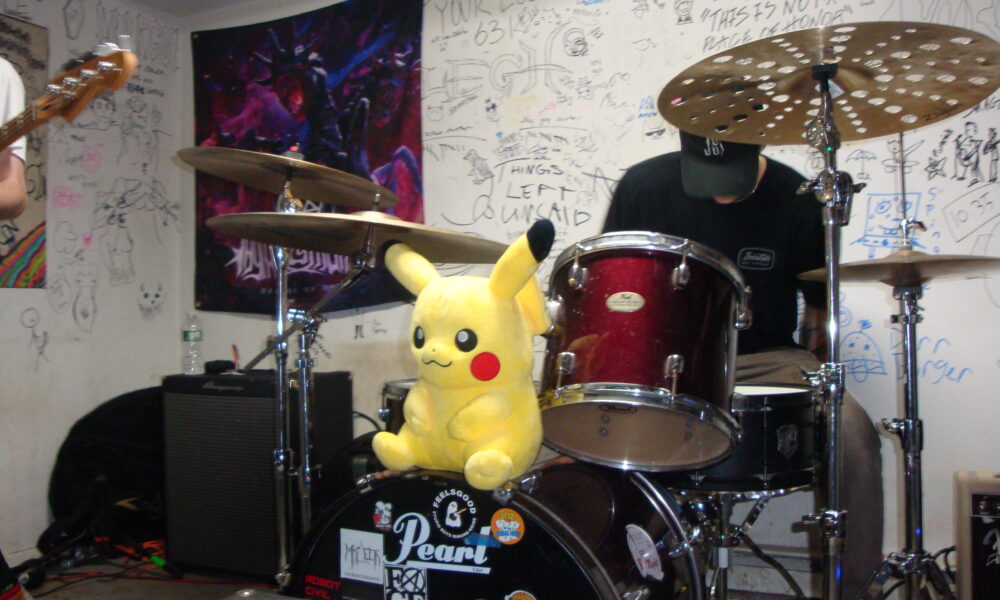Graphic by Jane Montalto
Corals are not colorful in real life. The water column filters the colors, making them look duller than they do in wildlife documentaries and high school science textbooks. This is only one out of the many things I learned from the scuba diving side of my life.
I dove in the ocean for the first time in May 2015, when I was 12. The boat cut the rough surface of the dark blue ocean around Ilha Grande, an island off the coast of the state of Rio de Janeiro in Brazil. I focused my gaze on the water, occasionally looking up to the horizon full of little islands covered by bright green treetops.
Although I had easily gone through the trainings, I was anxious. The ocean was different from the pool. It was wider, darker and scarier. Also, I wasn’t there as a tourist. My parents and I had taken an introductory scuba diving course three months prior, and it was time for us to be evaluated in the ocean and eventually certified as Open Water Divers.
I was sitting alone in the bow of the boat when an older woman approached me. She was probably in her 50s and wore a hair scarf stamped with pictures of hammerhead sharks — the ones she saw when she dived in the Galapagos, as she explained.
“I’m scared,” I told her, after we had talked for a few minutes.
“Everything we do for the first time is scary,” she said.
That was a sentence I kept with me for all my other first times.

My first attempt was miserable. When scuba diving, the water pressure compresses the air of the middle ears, which is painful. To avoid damaging them, it is necessary to restore the middle ear air volume by doing what we call “equalizing.” There are many methods to do that, and I failed at every single one of them. The instructor told me to go back to the boat and that I would have another chance after my parents were done.
I returned to the bow of the boat, where I silently cried for the next hour. When the instructor came back from the dive with my parents, he encouraged me to try one more time.
“It’s the hour of the sea turtle,” the captain of the boat said, also trying to convince me to give it another shot.
I decided to go because I could not bear the possibility of not being good enough. This time, I succeeded not only in equalizing but also in doing all the required exercises. More interestingly though, I saw a sea turtle. It flipped its fins calmly and gracefully, as if time didn’t exist underwater. From that perspective, sea creatures don’t look like they are swimming, they look like they are flying in the infinite blue background.
Coming back from the dive, I wrote a narrative about it in my diving log. I remember writing it in all caps because I thought capital letters were prettier than lower case.
Great dive! First I had trouble with the equalization of my ears and had to come back to the boat, but after that I came back and was able to do all the underwater exercises and strolling through the deep waters I was able to see many rays and fishes that I had never seen personally. I loved it!
At the end of that trip, I was certified as a Junior Open Water Diver — the most basic certification of the diving world. Still, I was far from what I wanted. Scuba diving isn’t as simple as putting on equipment and throwing yourself in the water. You can do it that way, sure. But if you value your life and your safety, you probably go through a course before every new type of dive you’re trying. And that’s why my parents and I returned to the pool of our non-coastal city in Brazil. We wanted to go deeper, dive during the night and explore the possibilities that an Advanced Diver certification would give us.

However, at the time, I didn’t know that that was what I wanted. I was doing it because my parents made me. On the second day of training, I had trouble fluctuating and, when I complained about it to my father, he laughed. I was infuriated. I didn’t want to be there, in that uncomfortably warm pool on a Saturday afternoon. He had made me. And now he was laughing at me? I slapped his face.
“Get out of the pool right now,” he yelled.
I took my equipment off and ran to the bathroom. Locked inside the cabin, I loudly cried over the black and red neoprene. We made up later.
The first step to our Advanced Diver certification happened in July 2017. It was my 21st dive. We dove in Lagoa dos Ingleses, or Lagoon of the English, which is a muddy lake in my home city.
This dive was excellent because I was able to dive in my home city (which has neither a sea nor a river).
In the following years, we got extra certifications in Wreck Diving and Enriched Air Diving. These allowed me to dive near wrecks and make my dives longer, respectively. Scuba diving wasn’t always fun, but, slowly, the uniqueness of it enchanted me.

My high school friends couldn’t say they survived a tropical storm right after diving with sharks in the Bahamas. They couldn’t say they spent their winter break watching the sun set in the Caribbean Sea in Honduras.
I logged every single dive I did. Some of them, like number 14, don’t have a description at all and others, like number 19, have a very short one. “Six turtles, I WILL ONLY SAY THAT!” On number 50, I wrote, “These 50 dives added to me a lot of things that I could never have imagined.”
Number 60 is the one with the lengthiest narrative. It happened on Jan. 2, 2020 — two months before the pandemic hit. On that day, I dove in a turquoise lake on the bottom of Abismo Anhumas, an abyss located in Bonito, a small town in the countryside of Brazil. I wrote down every detail about it, from rappelling down the abyss to seeing the skeleton of a tamanduá bandeira on the bottom of the lake. On the top of the page, I wrote, “W.O.N.D.E.R.F.U.L.” My small handwriting is proof that I was trying to make everything fit. The notes on the margins are proof that it wasn’t enough.
On number 86, I vented. The year was 2022. I was in Fernando de Noronha, Brazil, with my parents. First, I felt like I couldn’t keep up with their rhythm. Then, I was frustrated because I thought my father didn’t take my dive log seriously.

I don’t think he understands how important this dive log is to me, he doesn’t understand that I use it as a diary. On that note, I want to leave a thought here: I DON’T love to scuba dive. Okay?
From the beginning, logging my dives was something that I liked doing. Even if I didn’t want to dive, I did it, just so I could come back and write more. I documented eight years of scuba diving in those pages. My calligraphy changed. My grammar certainly improved. But what I find most magical is that I changed. My descriptions of every single one of those dives reflect the person I was at the time. In January 2023, I logged my 100th dive.

Century diver! Scuba diving continues to add to me in many ways that I could never imagine (see dive 50). Recently, I started a diary, I was unfair to you, diving log. But, in this text that I write on the boat’s table, I wanted to thank you for being such a loyal companion in these eight years as a scuba diver. I wanted to give up many times, but coming here to narrate my adventures with a tank was what gave me strength.
I focused my gaze on the water as the boat cut through the rough surface of the ocean. Technically, we were in the Abrolhos Archipelago, off the coast of Bahia, Brazil. But there were no islands on the horizon. We had sailed to more open waters. All I could see was the vast Atlantic Ocean.
I put on my suit, tightened my mask and adjusted my yellow fins. I jumped in the water and made a downwards thumb with my hand, signaling that I was starting to go down. With me were my parents, my uncle, my aunt and my 11-year-old cousin — who was only on his third scuba diving trip.
It wasn’t a dive with many creatures. Instead, we swam in a coral formation named Chapeirão Faca Cega. It translates to blind knife hat and was named after its skin-cutting sharpness. It’s the only of its kind.
It can be whatever you want. A cathedral, a castle, a forest — it’s mutable according to the perception of each person. Just like scuba diving.
What even is scuba diving? An extreme sport? An outdoor activity? A lifestyle? I have done it 101 times, and I don’t know yet. How can something so abstract in meaning be so distinguishable in the making?
For now, I’m fine not knowing the answer. The unknown calls for adventures and adventures lead to magnificent sea creatures, cries and writing sessions. They make me alive. They make me grow. The corals can look dull, but they definitely have something that keeps me going back to them.




Comments are closed.